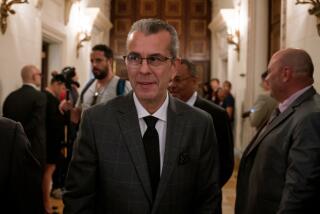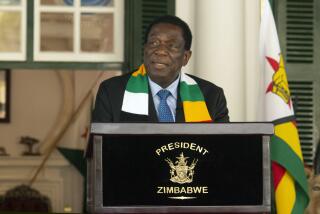Kenyan presidential loser Raila Odinga contests result
- Share via
NAIROBI, Kenya -- In a setback for Kenya’s efforts to cement its democracy, presidential contender Raila Odinga on Saturday refused to concede defeat in a close election he said was fraught with fraud and irregularities.
But he called for calm and vowed to act through the courts. Kenyans of all political persuasions are determined to avoid the violent aftermath of the disputed 2007 election, which saw tribal killings spread across the country.
Kenya’s independent election commission announced rival Uhuru Kenyatta the winner of the presidential election Saturday, angering Odinga’s Luo tribe, whose members feel they have been shut out of presidential power for decades.
Odinga’s supporters in the Nairobi slums of Kibera and Mathare expressed bitterness, declaring they had no confidence in Kenyan authorities or the election commission. They said they were awaiting a signal from Odinga’s Orange Democratic Movement to take to the streets, but instead Odinga urged people to avoid violence and wait for action by the courts.
“Any violence now could destroy this nation forever. That would not be in anyone’s interests. Let us treat each other as brothers and sisters,” he said.
“Nothing would have pleased me more if I’d lost fairly. But I have a duty and responsibility to protect democracy in this country. The struggle for democracy has been very long and we are not going to surrender it to the forces of darkness.”
The election of Kenyatta, an indicted war crimes suspect, will test Kenya’s relations with Western allies, despite his willingness to attend the trial, due to start in July, in order to clear his name. Kenyatta is accused by the International Criminal Court at the Hague of inciting followers to commit violence in the 2007 election, which saw more than 1,000 Kenyans killed in tribal violence.
U.S. officials had warned of “consequences” if Kenya elected Kenyatta as president. Secretary of State John Kerry congratulated Kenya on peaceful elections Saturday, but pointedly did not congratulate Kenyatta on his victory. Statements from Britain and the EU also stopped short of congratulating Kenyatta.
Kenyatta did not mention the ICC trial directly, but indicated he would attend the hearings at the Hague.
“We recognize and accept our international obligations and we will continue to cooperate with all nations and international institutions in line with those obligations,” he said at a press conference. “However, we also expect that the international community will respect our sovereignty and the democratic will of the people of Kenya.”
Odinga said there were “massive discrepancies” in the counting, and that the Independent Election and Boundaries Commission wouldn’t allow a recount, despite the small margin of around 8,000 votes by which Kenyatta crossed the 50% threshold to avoid a runoff.
Kenyatta squeaked into power with 50.07% of the vote, or 6,173,433 votes, to Odinga’s 5,340,546 tally. The turnout was 86%, the highest turnout in Kenya’s history, as 12,330,028 Kenyans cast ballots.
International observers have described the vote and count as transparent, according to Reuters.
Kenyatta’s supporters took to the streets with vuvuzelas (plastic trumpets) and drums to dance, sing and celebrate while Odinga supporters were so upset that some said they couldn’t eat, while others vowed never to vote again.
Kenyatta supporters said the result showed that Kenyan democracy had come of age, while their opponents said the opposite: that its democracy was still flawed and immature.
Despite the healthy turnout, Kenyans failed to elect any women as senators or governors, and the population voted largely along tribal lines.
The result left power in the hands of the elite in central Kenya and the Rift Valley that has ruled the country since independence, doling out patronage to tribal allies. Kenyatta’s father was the first president after Kenyan independence, and Kenyatta was nominated to parliament in 2001 by former president Daniel arap Moi and later appointed by Moi to the Cabinet as minister for local government.
ALSO:
U.N. peacekeepers in Syria to be freed
Conservative brand of Catholicism thrives in Africa
Venezuela’s Hugo Chavez in his heyday: A look at ‘el comandante’
More to Read
Sign up for Essential California
The most important California stories and recommendations in your inbox every morning.
You may occasionally receive promotional content from the Los Angeles Times.










